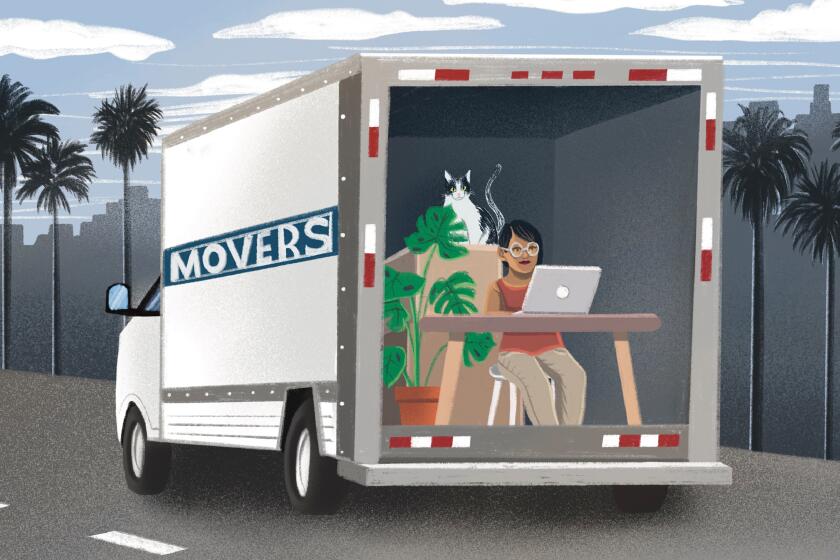Employers bow to tech workers in hottest job market since the dot-com era
‘I’ve never seen anything like it’: How remote work has upended the tech talent market.
- Share via
There’s an air of desperation among tech employers this summer. Software talent, it seems, is in such high demand that companies are morphing how they hire. And workers are the ones with the power.
Good and experienced tech workers are being treated like celebrities — hounded by recruiters, courted by managers, and bestowed a bevy of options before choosing their next boss.
“It makes you feel like you’re amazing, when really ... you’re just another software engineer that’s looking for a job,” said Henry Chesnutt, who just moved back to San Diego from San Francisco to work at the rapidly growing tech startup Flock Freight.
The job outlook for workers like Chesnutt has been good for much of the last decade. But now, a multitude of factors are driving competition for talent to a level not seen in nearly 20 years, some recruiters say.
“This is the most competitive market I can remember in my professional career, with many people comparing it to the dot-com market of the late ‘90s,” said Jim Bartolomea, vice president of global talent at tech titan ServiceNow, which employs a huge chunk of the software talent in San Diego.
Last month, employers posted more than 365,000 job openings for IT workers, the highest monthly total since September 2019, according to IT trade group CompTIA. The positions highest in demand include software developers, IT support specialists, systems engineers and architects.
Employers in California and the U.S. are scrambling to fill jobs as the dust from the pandemic begins to settle. Just don’t call it a labor shortage.
The demand has been attributed to all sorts of things. During the pandemic, businesses that had been slow to adopt enterprise software began rapidly catching up. A tidal wave of productivity software, conferencing and collaboration tools, and e-commerce tech flooded the world. The same was true for consumer tech, with video game development, entertainment tech and social platforms booming.
Many of these jobs are going unfilled, as competition for new hires ramps up.
Simultaneously, remote work became the status quo in the tech industry. Suddenly, software talent could pick and choose from a massive pool of job opportunities. All while existing talent is beginning to stray.
Roughly a third of more than 2,800 IT professionals said they plan to look for a new job in the next few months, according to a recent Robert Half International survey.
Aaron Bartholomew, a lead backend developer at tech company Trust & Will, just went through a two-month job search in which he held the power in the employer-worker exchange.
“I realized pretty quick that I was the one with the upper hand,” Bartholomew said. “All these companies were moving incredibly fast to try and close on me.”
Software interviews have a reputation for being slow, painful processes that involve tests of logic, design and computer science knowledge. Years ago, Chesnutt was tested for five straight hours on algorithms during an interview with YouTube.
But now, these technical interviews are often being waived, said Chesnutt and Bartholomew, who both experienced this step dropped for the sake of urgency. Recruiters are increasingly using what Chesnutt sees as pressure tactics, such as “exploding offers,” which are job offers that self-detonate at a set date and time if engineers don’t accept them soon enough.
“They’ll try to rush you through the process as soon as possible, and get you to sign that day while they’re on the phone with you,” Chesnutt said.
Brett Wayne, a tech recruiter and managing director at Cypress, said the competitive pressure is unlike anything he’s seen in his 13-year career in recruiting. He likened it to what’s happening in the real estate market.
Just like a hot property with multiple bids, Chesnutt ended his job hunt with four employment offers.
To win a bid on a quality engineer, companies are offering things such as flexible hours, sign-on bonuses and permanent remote work, the last of which has become a requirement for much of the workforce. Dice, a website and staffing firm that focuses on tech talent, published a report in June that found only 17% of technologists wanted to work in an office full time, while 59% wanted remote and hybrid approaches.
Working from home will become the norm for many employees even after the pandemic ends. But prepare for a pay cut.
Wayne said he’s observed companies shoot themselves in the foot by not offering remote options, making an already slim candidate pool even slimmer.
“If it was hard to hire talent 18 months ago — and now you cut the group you’re going for in half — it’s going to be really tough for you,” Wayne said.
Bartholomew said he’s watched a great migration of developers out of urban areas, riding remote work out of San Diego or other cities.
“Literally about 50% of my peer group has moved,” Bartholomew said. “Companies that adapt will get the majority of the talent pool.”
It’s not strict remote work, however, that seems to be appealing to the majority of engineers, according to the Dice report. It’s more about flexibility to choose.
“While many technologists would still prefer to work 100% remotely, there is an equal desire for a hybrid approach, and we’ve actually seen fewer remote days per week become more desirable over the past year,” Art Zeile, CEO chief executive of Dice, said in a statement. “The companies who succeed in attracting and retaining top talent will be those who take the time to build an agile approach that gives technologists flexibility and control over their work environment.”
U.S. tech salaries are also on the rise. A recent Dice report found tech jobs saw an average salary increase of 3.6% between late 2019 and late 2020. That might not sound like much, but it’s a significant jump compared with 2017, 2018 and 2019, when annual increases were less than 1%.
U.S. employers across all industries — not just tech — reported their strongest hiring outlook since 2000, according to an employment outlook survey published by staffing giant ManpowerGroup in June.
“It’s a worker’s market, and employees are acting like consumers in how they are consuming work — seeking flexibility, competitive pay and fast decisions,” Becky Frankiewicz, ManpowerGroup president for North America, said in a statement. “Now is the time for employers to get creative to attract talent — and to hold onto the workers they have with both hands.”
More to Read
Inside the business of entertainment
The Wide Shot brings you news, analysis and insights on everything from streaming wars to production — and what it all means for the future.
You may occasionally receive promotional content from the Los Angeles Times.












